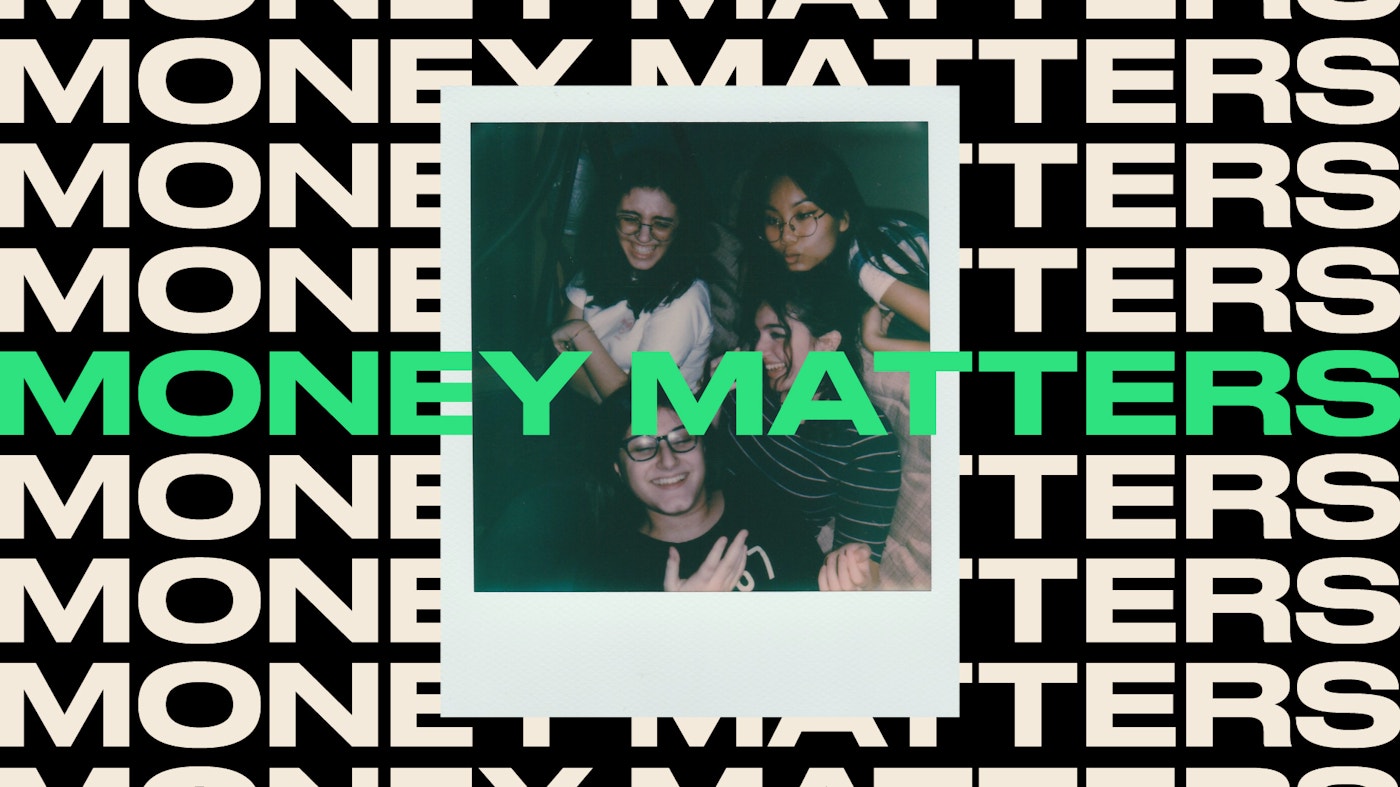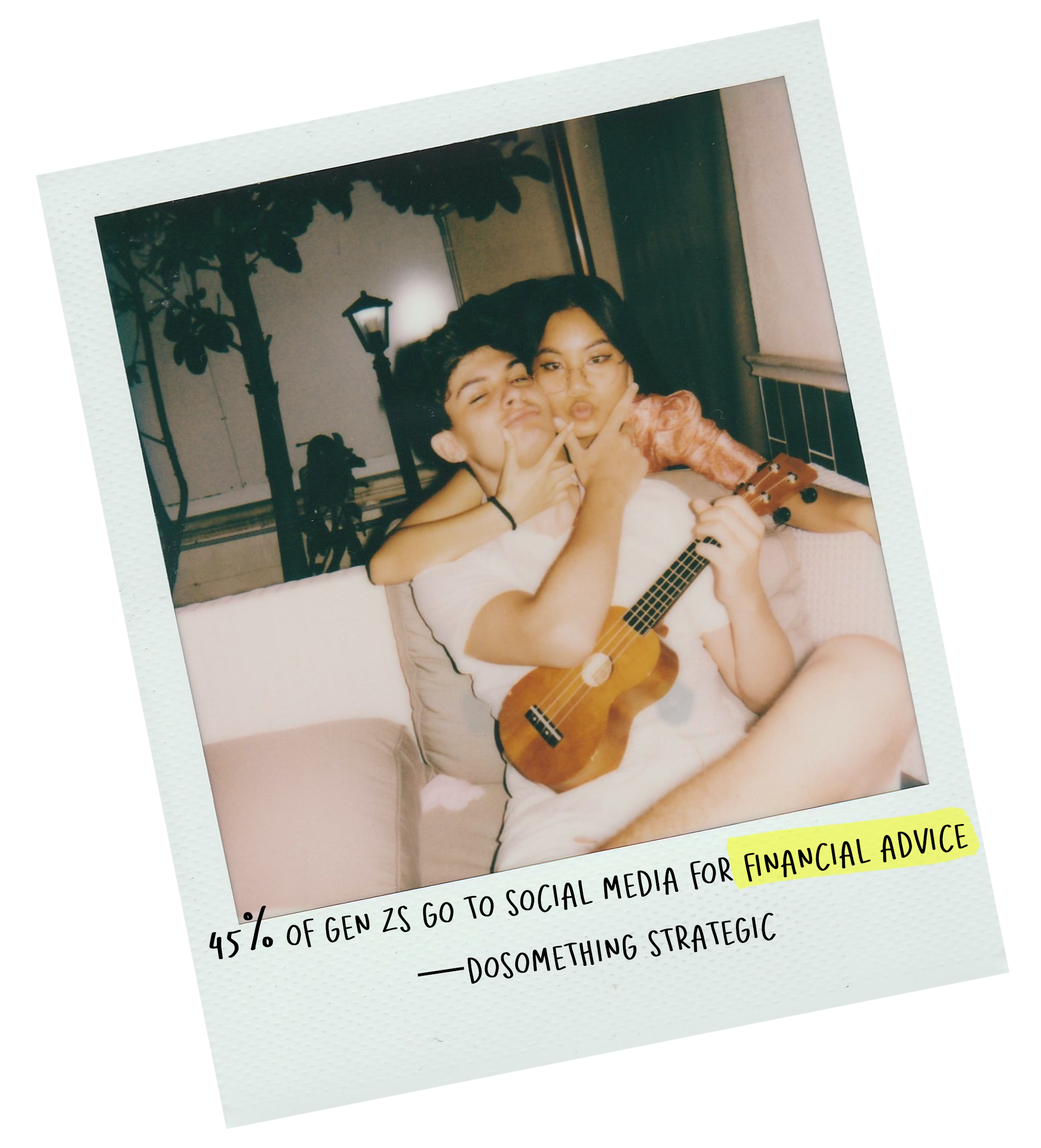
10 Min. Read
Money Matters
Regardless of whether or not the pandemic impacted their individual finances, Gen Zs say that their relationship with money has changed over the course of the last year.
They described a renewed interest in saving, budgeting, and investing as well as a growing awareness regarding the reality of financial inequity and the role it plays in their lives. As Gen Z prepares themselves to start fresh, you can expect financial wellness to rise as the newest trend in self-care, and for individuals who made it out of 2020 unscathed to exhibit financial survivor’s guilt.

Playing an Uneven Field
For Americans of all ages, the pandemic changed the conversation around money, so we’d be remiss not to address the elephant in the room — wealth inequality — especially given the frequency Gen Z openly discusses the uneven financial playing field. Populism and class rage had been festering in America long before the first COVID case, especially for Generation Z who accessorized with “Eat the Rich” earrings as they made “OK Boomer” TikTok videos. But the pandemic truly laid bare the class divisions in real time.
Remote schooling invited Gen Zs into their classmates’ houses, apartments, or lack thereof, making clear who was living stimulus check to stimulus check versus who was able to quarantine in comfort. Some young people were busy playing the stock market while others became the breadwinner for the family given parental health or employment status. For those on the wrong side of the income gap there were real health repercussions that no amount of homegrown GoFundMe campaigns could cover. “Lucky” Gen Zs, whose status was relatively unaffected by the pandemic, still experienced the mental health consequences of financial instability, with many reporting survivor’s guilt as well as anxiously as they waited for their own stability to crumble.
All of this is to say that while acknowledging Gen’s financial standing is by no means a monolith, we are seeing trends across the generation in the way they approach money matters.

- 30%
- of Americans say the pandemic has made their financial situation worse, while 30% say it has made their financial situation better. — Personal finance site The Balance
- 80%
- of Gen Zs agree that “spending wisely is more important than earning a lot of money” — Wonder Thompson Intelligence
Pandemic Impact
Overall, Gen Z is emerging from their COVID cocoons with stronger values, but weaker wallets. In fact, they’re the generation most negatively impacted financially by the pandemic both in the short term and foreseeable future. After all, whether they’re launching their careers or just entering college, Gen Z is of the age and life stage where a part-time job waiting tables might be the difference between a savings account and taking on debt.
Overrepresented in service industries before the pandemic, Gen Z accounted for a quarter of American employees working in hospitality and leisure jobs. Employment in these sectors decreased by 41% between February and May 2020 alone; It’s no wonder that during that same period a record 32% of 16- to 19-year-olds were unemployed, more than twice the rate for those 25 and older. Gen Z has been disproportionately likely to apply for government benefits, and been forced to postpone saving as well as paying off debt, according to a study conducted byGeorgetown University’s McDonough School of Business. And if all of this wasn’t enough to make Gen Z nervous about their financial futures, research suggests that kickstarting your career in a recession can result in lower earnings for up to 15 years after graduation — as well as higher divorce rates and even shorter lifespans.
No wonder we’re hearing many Gen Zs express a renewed interest in financial planning, with strategies they plan to continue long past vaccination. Before the pandemic, Generation Z’s top new year’s resolutions were focused on health and happiness according to YPulse. But as they counted down the end of the dumpster fire that was 2020, money rose to the top of Gen Z’s resolutions with “earn more money” (76%) and “save more money” (60%) taking the top two spots respectively. And while they may be manifesting future success (read The Manifestation Movement for more on that), Gen Z is also acting with financial caution: 70% of Zs report significantly altering their spending habits, according to research by Wunderman Thompson.
I’ve started saving more money working four different jobs… COVID made me want to try and save even more.
Tyler, 19

61% of Gen Zs say a “skill-based education” is a smarter choice than a traditional four year college.
—EMC and VICE Media

Frugal is the New Sexy
Never ones to lust after McMansions and already concerned about climate change, Gen Z has long approached frugality in a values-driven manner. COVID cemented frugality as a core value of the generation and actively taught them how to effectively save money, according to a recent report by the Center for Generational Kinetics. These days, 65% of Gen Zs proudly consider themselves “savers” rather than “spenders.” As TBWA’s cultural intelligence unit recently put it, “frugal is the new sexy.”
Not wanting to spend their lives earning money they waste, Gen Z is trading the dream of “more money” for “more savings.” A full 80% of young people agree that “spending wisely is more important than earning a lot of money,” and 77% “make sure to save some money every time they earn or receive it,” according to research by Wonder Thompson Intelligence.
Debt-Free Dreams
Gen Z is not only finding their frugal side, they’re generally more opposed to debt than other generations. Gen Zs were already less likely than Millennials to have debt, according to a pre-pandemic study by Northwestern Mutual. Though this is partially due to their life stage, financial experts believe the desire to be debt-free will remain a defining generational trait. “Gen Zers have higher credit scores and are less likely to have difficulty paying off debt since they’re less likely to take it on,” said Brian Meiggs, founder of the personal finance site My Millennial Guide. “Gen Z comes out on top with a higher number of them saving from an early age and sticking to a budget.”
This aversion to debt is one of the core reasons that Gen Z is increasingly opting out of traditional four-year colleges, despite statistical evidence that higher degrees result in higher salaries. But, as many Zs argue, the cost of college has doubled since the time most of these studies were conducted. Boomers paid on average $39,780 in today’s dollars for four years of public college, while Millennials averaged $70,000 in tuition costs and Gen Z is currently facing roughly $90,875 annually. And the cost of private college tuition has snowballed: $80,000 in inflation-adjusted dollars for Boomers, $165,000 for Millennials and a staggering $210,000 for Generation Z, according to recent research conducted by GoBankingRates.
With this context, it’s little surprise that Gen Zs are increasingly turning to trade apprenticeships, digital jobs, pieced together Reddit degrees, TikTok tutorials, coding bootcamps, and social commerce as they pave non-conventional (and budget friendly!) paths forward. In fact, 61% of Gen Zs now believe that “skill-based education,” such as coding bootcamps, nursing schools and the like, are a smarter choice than traditional four year colleges, according to a recent study conducted by EMC and VICE Media.
Another way that Gen Zs are pursuing their debt-free daydreams is through alternative payment options. Many Zs we’ve spoken with are embracing paying in installments or “But Now, Pay Later” programs. Though one could argue that the latter is a form of debt, just not credit card debt, many Gen Zs see it as a safe way to stay within their means. Case in point: participation in “BNPL” programs have increased by 201% over the last year.
The Rise of the Finfluencer
Given that Gen Zs trust influencers more than traditional brand spokespeople and celebrities, it makes sense that they would go to these sources as they embark on their unconventional financial path. We’re seeing a rise of influencers stepping up to teach financial literacy and help Zs find their footing on the rocky stock market seas ahead. Connecting with Zs on a variety of social platforms, so-called “finfluencers,” aka financial influencers, like Humphrey Yang have amassed millions of followers.
Finfluencers don’t just serve up quippy TikToks and YouTube videos. According to many Zs, the most reputable content creators actually provide in-depth financial literacy education that many Zs say they never got from their parents or teachers. For example, Haley Sacks — the Instagram influencer known as Mrs. Dow Jones — recently announced a new eight-week program to help curious young investors navigate and manage their finances, complete with weekly themes including career goals, taxes, healthcare, and retirement planning.
Of course, like all things trending on TikTok, reputable sources come with equal parts misinformation.
Researchers now warn that getting financial advice from social networks mainly known for dance challenges and thirst traps might be one of the reasons that 18- to- 24-year-olds were, for the first time ever, as vulnerable to financial scams as those 65-and-over, according to The Better Business Bureau.

New Age Investors
While 20-somethings in previous generations may have hoarded their money away in piggy banks or low-yield savings accounts, Gen Zs — armed with more information about investing platforms — is getting savvy about the stock market. They’re leading a new generation of investors like we’ve never seen before. And like many other tech-driven trends, the pandemic accelerated this trend of young investors. “COVID, being at home — it forced people online and it forced people to get out of the central school bubble,” explained Gen Z VC’s founder Meagan Loyst, 23, to Business Insider. Founded in November 2020, Gen Z VCs has already grown into a community of more than 6,000 young investors.
In fact, there’s currently a record number of Gen Z inventors in the U.S., according to Apex Clearing. Not all of them were raised being fed by a silver spoon; many of them work part time DoorDashing, walking dogs, or Ubering in order to save enough capital to invest, or pool their resources with others. Digitally savvy, Gen Zs are tapping into newish tools like Slack, Angelist, Discord, Zoom, Republic, and DocSend to get the deals done. This allows them to move and pivot more quickly than their old-school counterparts. “It’s probably not the old man’s game anymore, which I think is awesome,” Nik Sharma, CEO of Sharma Brands and a Gen Z investor.


There are also plenty of Gen Z investors taking a more nontraditional approach to the markets with the help of Reddit, Twitter and TikTok, as well as those investing in a somewhat cheeky (and risky) manner. Gen Zs are not only investing in cryptocurrencies, they’re often the first to embrace more leading-edge “alt coins,” aka the most speculative and high-risk cryptos on the market. Forget bitcoin — that’s the “dinosaur of crypto,” according to Zs, who have also termed it “Boomer coin” for its buzz among older generations of investors. Rather Zs are on the hunt for “the next big thing,” whether that be doge, safemoon,shiba inu, or whatever’s newest on the market. Sure, these Gen Zs want to make money, but they’re also using their investments to illustrate how the game is rigged and somewhat silly. Twitter user @lunch_enjoyer summed this complicated attitude up best when he tweeted, “The irs can keep my stimulus check. i don’t care. just give me $100 and I’ll that shit turn into $1,000 on the robinhood app. then turn that to $395 because i tried to win an iPad in a claw machine at a rest stop. you gotta spend money to make money player.”
Zs are also leading a movement towards investing in “alternative asset investments” in the form of high-ticket luxury fashion. Unlike faceless stocks or crypto, Zs see fashion and streetwear as having the added benefit of baked-in cultural currency, along with its traditional monetary value. During the pandemic, many Zs did their homework on the resale market, and started picking up luxury pieces to flip for a profit. Recently, a black Gucci Marmont bag, for example, could earn its seller a 76% return on resale site Vestiaire, according to Vogue Business. Meanwhile, sneaker resale site StockX, who’s primary users are under 25 years old, saw first-time sellers flip $800 million worth of product between March 2020 and April 2021. This surge was primarily fueled by young people looking for a lucrative “side hustle,” StockX senior economist Jesse Einhorn told Vogue Business.

A Bright Financial Future
Sure historically those entering the workforce during a recession may have had the odds stacked against them, but Gen Z is still personally optimistic about their futures. Why? Well, for one thing, they have actually started saving and building retirement funds far earlier than past generations. In fact, saving tool Stash saw a 118% increase in 18- to 24-year-olds opening retirement accounts since the start of 2020. But more than that, Zs see themselves as a generation determined to not repeat the mistakes of the past. For Generation Z, money matters more now than ever because it’s the foundation they need to build their post-pandemic fresh start upon, hopefully manifesting just the future they so deeply desire.
No strangers to economic disruption, Zs aren’t just approaching money as a means to making their own lives better. They’re looking at the overall system and participating in the economy with the intention of changing it for the better. Of course, they want to be personally stable and not live paycheck to paycheck — but they aren’t vying to be a part of the 1% either. Many Gen Zs say they’re fighting for equality, and to bring back the American middle class. As Sandra Salvatierra, director of brand at JUV Consulting put it, “Millennials want a seat at the table. Gen Z wants to flip the table.”


What It Means For Brands:
- Acknowledge that while Gen Zs are far from a monolith financially, it’s become a highly emotional topic for most. This generation is not only looking for financial advice, but also financial catharsis.
- Gen Z’s relationship status with money is complicated. While they want to excel at investing and create stable financial futures, they also want to invest in making the world a better place for everyone.
- The new luxury is populist. Embrace an inclusionary vibe in your brand communications, products and events, especially when it comes to finances.
Provide Gen Z with reliable and accessible financial tools and education as related to your product. A little goes a long way, as it shows that your brand has got their back. - Gen Z still loves a good “Buy Now, Pay Later” or installment plan. Consider offering payment alternatives to traditional credit or cash that allows them to work within their budget and avoid dreaded debt.


